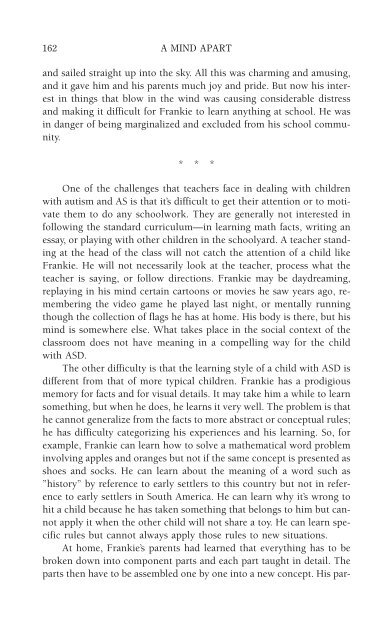978-1572305441
autism
autism
Create successful ePaper yourself
Turn your PDF publications into a flip-book with our unique Google optimized e-Paper software.
162 A MIND APART<br />
and sailed straight up into the sky. All this was charming and amusing,<br />
and it gave him and his parents much joy and pride. But now his interest<br />
in things that blow in the wind was causing considerable distress<br />
and making it difficult for Frankie to learn anything at school. He was<br />
in danger of being marginalized and excluded from his school community.<br />
* * *<br />
One of the challenges that teachers face in dealing with children<br />
with autism and AS is that it’s difficult to get their attention or to motivate<br />
them to do any schoolwork. They are generally not interested in<br />
following the standard curriculum—in learning math facts, writing an<br />
essay, or playing with other children in the schoolyard. A teacher standing<br />
at the head of the class will not catch the attention of a child like<br />
Frankie. He will not necessarily look at the teacher, process what the<br />
teacher is saying, or follow directions. Frankie may be daydreaming,<br />
replaying in his mind certain cartoons or movies he saw years ago, remembering<br />
the video game he played last night, or mentally running<br />
though the collection of flags he has at home. His body is there, but his<br />
mind is somewhere else. What takes place in the social context of the<br />
classroom does not have meaning in a compelling way for the child<br />
with ASD.<br />
The other difficulty is that the learning style of a child with ASD is<br />
different from that of more typical children. Frankie has a prodigious<br />
memory for facts and for visual details. It may take him a while to learn<br />
something, but when he does, he learns it very well. The problem is that<br />
he cannot generalize from the facts to more abstract or conceptual rules;<br />
he has difficulty categorizing his experiences and his learning. So, for<br />
example, Frankie can learn how to solve a mathematical word problem<br />
involving apples and oranges but not if the same concept is presented as<br />
shoes and socks. He can learn about the meaning of a word such as<br />
”history” by reference to early settlers to this country but not in reference<br />
to early settlers in South America. He can learn why it’s wrong to<br />
hit a child because he has taken something that belongs to him but cannot<br />
apply it when the other child will not share a toy. He can learn specific<br />
rules but cannot always apply those rules to new situations.<br />
At home, Frankie’s parents had learned that everything has to be<br />
broken down into component parts and each part taught in detail. The<br />
parts then have to be assembled one by one into a new concept. His par-



